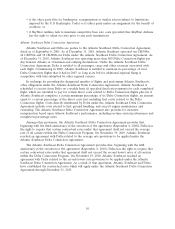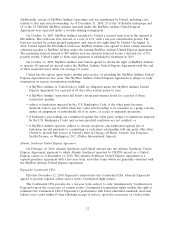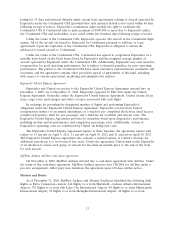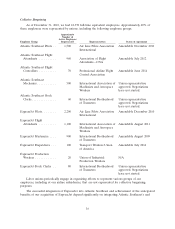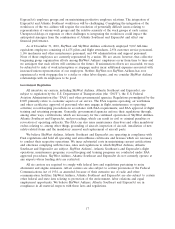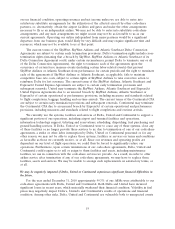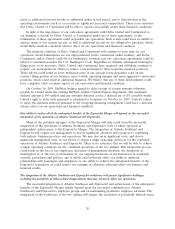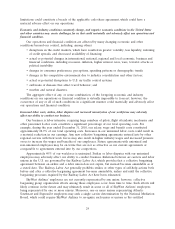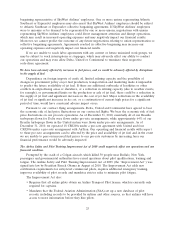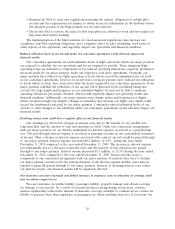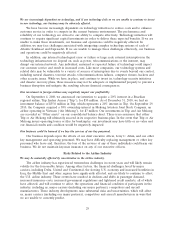SkyWest Airlines 2010 Annual Report Download - page 24
Download and view the complete annual report
Please find page 24 of the 2010 SkyWest Airlines annual report below. You can navigate through the pages in the report by either clicking on the pages listed below, or by using the keyword search tool below to find specific information within the annual report.(such as additional terrorist attacks or additional spikes in fuel prices) and to deterioration of the
operating environment (such as a recession or significant increased competition). There is no assurance
that Delta, United or Continental will be able to operate successfully under these financial conditions.
In light of the importance of our code-share agreements with Delta, United and Continental to
our business, a default by Delta, United or Continental under any of these agreements, or the
termination of these agreements could jeopardize our operations. Such events could leave us unable to
operate many of our current aircraft, as well as additional aircraft we are obligated to purchase, which
would likely result in a material adverse effect on our operations and financial condition.
The financial condition of Delta, United and Continental will continue to pose risks for our
operations. Serial bankruptcies are not unprecedented in the commercial airline industry, and Delta,
Continental and/or United could file for bankruptcy, in which case our code-share agreements could be
subject to termination under the U.S. Bankruptcy Code. Regardless of whether subsequent bankruptcy
filings prove to be necessary, Delta, United and Continental have required, and will likely continue to
require, our participation in efforts to reduce costs and improve their respective financial positions.
These efforts could result in lower utilization rates of our aircraft, lower departure rates on the
contract flying portion of our business, more volatile operating margins and more aggressive contractual
positions, which could result in additional litigation. We believe that any of these developments could
have a negative effect on many aspects of our operations and financial condition.
On October 16, 2009, SkyWest Airlines agreed to defer receipt of certain amounts otherwise
payable by United under the existing SkyWest Airlines United Express Agreement. The maximum
deferral amount is $49 million and any amounts deferred accrue a deferral fee of 8%, payable weekly.
United’s right to defer such payments is scheduled to terminate on October 16, 2019. United’s failure
to repay the amounts deferred pursuant to the foregoing financing arrangement could have a material
adverse effect on our operations and financial condition.
Our ability to realize all of the anticipated benefits of the ExpressJet Merger will depend on the successful
integration of the operations of Atlantic Southeast and ExpressJet.
Many of the potential synergies of the ExpressJet Merger will only result from the successful
integration of the operations of Atlantic Southeast and ExpressJet, both of which operated as
independent airlines prior to the ExpressJet Merger. The integration of Atlantic Southeast and
ExpressJet will require our management to devote significant attention and resources to combining
both airlines’ business practices and operations. We may also incur significant costs, and devote
significant management time, in our efforts to obtain a single operating certificate for the combined
operations of Atlantic Southeast and ExpressJet. There is no assurance that we will be able to achieve
a single operating certificate for the combined operations of the two airlines. This integration process
could result in the loss of key employees, diversion of management attention, the disruption or
interruption of, or the loss of momentum in, our ongoing businesses or inconsistencies in standards,
controls, procedures and policies, any of which could adversely affect our ability to maintain
relationships with passengers and employees or our ability to achieve the anticipated benefits of the
ExpressJet acquisition, or could reduce our earnings or otherwise adversely affect our business and
financial results.
The integration of the Atlantic Southeast and ExpressJet workforces will present significant challenges,
including the possibility of labor-related disagreements that may adversely affect our operations.
The successful integration of Atlantic Southeast and ExpressJet and achievement of the anticipated
benefits of the ExpressJet Merger largely depend upon the successful combination of Atlantic
Southeast’s and ExpressJet’s employee groups and on maintaining productive employee relations. The
integration of the workforces of the two airlines will require the resolution of potentially difficult issues
20


